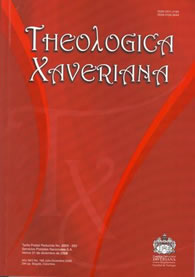Abstract
This is the result of an inquiry searching to understand the relationship between ideology and faith in Latin American theology starting from the conception of anthropological faith in the work of Juan Luis Segundo. We think that the question of ideology and its relationship to faith continues to be a question of relevance now in Christian thinking in the face of the old and the new human problems that the present time sets before us. We concentrate on the writings of Juan Luis Segundo, one of the main exponents of this theology, since, in our view, he is the theologian who most explicitly exposed the question of ideology and its relationship to faith in the Latin American context.
This journal is registered under a Creative Commons Attribution 4.0 International Public License. Thus, this work may be reproduced, distributed, and publicly shared in digital format, as long as the names of the authors and Pontificia Universidad Javeriana are acknowledged. Others are allowed to quote, adapt, transform, auto-archive, republish, and create based on this material, for any purpose (even commercial ones), provided the authorship is duly acknowledged, a link to the original work is provided, and it is specified if changes have been made. Pontificia Universidad Javeriana does not hold the rights of published works and the authors are solely responsible for the contents of their works; they keep the moral, intellectual, privacy, and publicity rights.
Approving the intervention of the work (review, copy-editing, translation, layout) and the following outreach, are granted through an use license and not through an assignment of rights. This means the journal and Pontificia Universidad Javeriana cannot be held responsible for any ethical malpractice by the authors. As a consequence of the protection granted by the use license, the journal is not required to publish recantations or modify information already published, unless the errata stems from the editorial management process. Publishing contents in this journal does not generate royalties for contributors.


